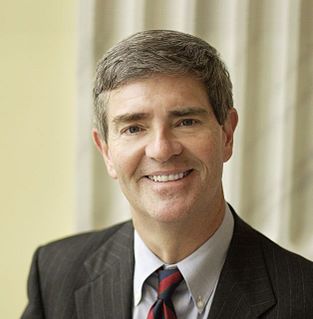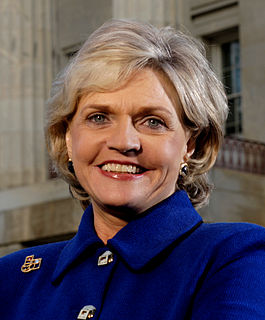External links
- Official biography Archived 2004-10-27 at the Wayback Machine
- Sea of Greed (book by Doug McCullough)
J. Douglas McCullough is an American lawyer and former judge of the North Carolina Court of Appeals. McCullough retired in 2017. [1]
After earning a history degree from the University of North Carolina at Chapel Hill in 1967 and a Juris Doctor degree from the University of South Carolina in 1970, McCullough served in the United States Marine Corps, retiring as a colonel in the Marine Corps Reserves. McCullough worked as legislative counsel for New Mexico Senator Harrison Schmitt, as a counsel to the United States Senate, and finally as an Assistant United States Attorney in the eastern district of North Carolina from 1981 through 1996, when he left to enter private practice.
In November 2000, McCullough was elected to the North Carolina Court of Appeals with just over 50 percent of the vote, defeating incumbent Clarence Horton. [2]
He is married to Lucci McCullough and has two children. He resides in Atlantic Beach, NC.
On October 7, 2006, McCullough was charged with drunk driving. He pleaded guilty to driving while impaired on April 3, 2007. [3]
McCullough is a registered Republican, but in his 2008 bid for re-election, he cited bipartisan support from notables such as former NC Supreme Court Chief Justices Burley Mitchell (a Democrat) and I. Beverly Lake Jr. (a Republican). [4] He also enjoyed support from former North Carolina Court of Appeals Judges S. Gerald Arnold, Sidney S. Eagles, K. Edward Greene, and Albert S. Thomas Jr.
McCullough was criticized in 2007 for implying that he and other incumbent Republican incumbents should be re-elected because they would favor Republicans in an anticipated lawsuit over redistricting. [5] [6] [7] An ethics complaint was filed against him as a result of his comments. [8] In response to the complaint, the state Judicial Standards Commission said it would not punish McCullough, but it also said that it had made "an effort to ensure such conduct is not repeated." [9]
McCullough was defeated in the November 2008 election by state District Court judge Cheri Beasley. [10] [11]
McCullough won a new term on the Court of Appeals in 2010, when he came in second in the first round, but won the second round, of the first use of instant runoff voting for a statewide election in North Carolina. He narrowly defeated appointed incumbent judge Cressie Thigpen. [12]

Elaine Folk Marshall is an American attorney and politician who has served as the North Carolina Secretary of State since 1997. A member of the Democratic Party, she is the first woman to be elected to statewide office in North Carolina. Marshall was the Democratic nominee for the United States Senate seat currently held by Republican Richard Burr in the 2010 election, which she lost. In 2016, Marshall was re-elected to a sixth term as North Carolina Secretary of State with 52.26 percent of the vote, earning more votes than any other Democrat running statewide.

James Boyce Black is a member of the North Carolina Democratic Party, and a former member of the North Carolina General Assembly, who represented the state's 100th House district, including constituents in Mecklenburg County. An optometrist from Matthews, North Carolina, Black was elected to 11 (non-consecutive) terms in the House of Representatives, and served as Speaker of the House from January 1999 through the end of 2006, when scandal forced him to give up the leadership post. For the 2003-2004 legislative session Black was elected to serve as "Co-Speaker" with Republican Richard T. Morgan serving as the other Co-Speaker. He is tied with Liston B. Ramsey as longest-serving Speaker in state history.

Roy Asberry Cooper III is an American attorney and politician, serving as the 75th governor of North Carolina since 2017. A member of the Democratic Party, he served as the 49th attorney general of North Carolina from 2001 to 2017. He also served in the North Carolina General Assembly in both the House of Representatives (1987–1991) and Senate (1991–2001).

Ralph Bradley Miller is an American attorney and former U.S. Representative for North Carolina's 13th congressional district, serving from 2003 to 2013. District 13 included all of Caswell and Person counties, and parts of Alamance, Granville, Guilford, Rockingham and Wake counties. He is a member of the Democratic Party.

The North Carolina Court of Appeals is the only intermediate appellate court in the state of North Carolina. It is composed of fifteen members who sit in rotating panels of three. The Court of Appeals was created by the North Carolina General Assembly in 1967 after voters approved a constitutional amendment in 1965 which "authorized the creation of an intermediate court of appeals to relieve pressure on the North Carolina Supreme Court."

Several judges of the North Carolina Supreme Court and the North Carolina Court of Appeals, the state's two appellate courts, were elected on November 2, 2004. The 2004 United States presidential election, 2004 United States House election, 2004 United States Senate election, 2004 North Carolina Council of State election and 2004 North Carolina General Assembly election were held on the same day.

The 2008 North Carolina gubernatorial election was held on November 4, 2008, coinciding with the presidential, U.S. Senate, U.S. House elections, Council of State and statewide judicial elections. Democrat Bev Perdue won the election. With a margin of 3.39%, this election was the closest race of the 2008 gubernatorial election cycle.

North Carolina elections to choose members of the Council of State were held November 4, 2008. This coincided with the presidential, U.S. Senate, U.S. House, gubernatorial, and statewide judicial elections.

The 2008 United States Senate election in North Carolina was held on Tuesday, November 4, 2008. The Senate election coincided with the presidential, U.S. House elections, gubernatorial, Council of State, and statewide judicial elections. Incumbent Republican U.S. Senator Elizabeth Dole ran for re-election to a second term, but was defeated by Democrat Kay Hagan.
John S. Arrowood is an American attorney and judge. In April 2017, Arrowood was appointed to the North Carolina Court of Appeals by Governor Roy Cooper, to replace Judge Doug McCullough, a Republican who resigned one month before he would have reached the mandatory retirement age.

One justice of the North Carolina Supreme Court and six judges of the North Carolina Court of Appeals were elected to eight-year terms by North Carolina voters on November 4, 2008. This coincided with the presidential, U.S. Senate, U.S. House, gubernatorial, and Council of State elections.

Samuel James Ervin IV is a North Carolina lawyer and jurist who has served on the North Carolina Supreme Court since January 1, 2015. He previously served as a state Utilities Commissioner and as a judge of the North Carolina Court of Appeals. He is the grandson of U.S. Senator Sam J. Ervin, Jr. and the son of U.S. Court of Appeals for the Fourth Circuit Judge Sam J. Ervin III.

One justice of the North Carolina Supreme Court and five judges of the North Carolina Court of Appeals were elected by North Carolina voters on November 2, 2010, on the same day as the U.S. Senate election, U.S. House elections, and other state-level elections. North Carolina judicial elections are non-partisan. Terms for seats on each court are eight years. All incumbent judges and justices who sought re-election won their respective races, except for Judge Cressie Thigpen of the Court of Appeals, who had been appointed shortly before the election and lost North Carolina's first statewide election to use Instant-runoff voting.
Cressie H. Thigpen, Jr. is a North Carolina lawyer and jurist who served on the North Carolina Court of Appeals.

One justice of the North Carolina Supreme Court and three judges of the North Carolina Court of Appeals were elected by North Carolina voters on November 6, 2012, concurrently with the elections for Governor and other offices. North Carolina judicial elections are non-partisan. Terms for seats on each court are eight years. In three of the four races, incumbents were re-elected to their seats, but incumbent Court of Appeals Judge Cressie Thigpen was defeated by Chris Dillon.

The 2014 United States House of Representatives elections in North Carolina were held on Tuesday, November 4, 2014 to elect the 13 U.S. representatives from the state of North Carolina, one from each of the state's 13 congressional districts. The elections coincided with other elections to the United States Senate and House of Representatives and various state and local elections, including an election to the U.S. Senate.

Four justices of the seven-member North Carolina Supreme Court and four judges of the 15-member North Carolina Court of Appeals were elected by North Carolina voters on November 4, 2014, concurrently with other state elections. Terms for seats on each court are eight years.

One justice of the seven-member North Carolina Supreme Court and five judges of the 15-member North Carolina Court of Appeals were elected by North Carolina voters on November 8, 2016, concurrently with other state elections. Terms for seats on each court are eight years.

One justice of the seven-member North Carolina Supreme Court and three judges of the 15-member North Carolina Court of Appeals were elected by North Carolina voters on November 6, 2018, concurrently with other state elections. Terms for seats on each court are eight years. These elections were partisan for the first time since the elections of 2002. A law passed by the North Carolina General Assembly in 2017 cancelled primary elections for judicial elections in 2018 only, meaning that an unlimited number of candidates from any party could run in the general election.

The 2018 United States House of Representatives elections in North Carolina were held on November 6, 2018, electing the thirteen U.S. representatives from the State of North Carolina, one from each of the state's congressional districts. The elections coincided with other elections to the House of Representatives, as well as elections to the United States Senate and various state and local elections.